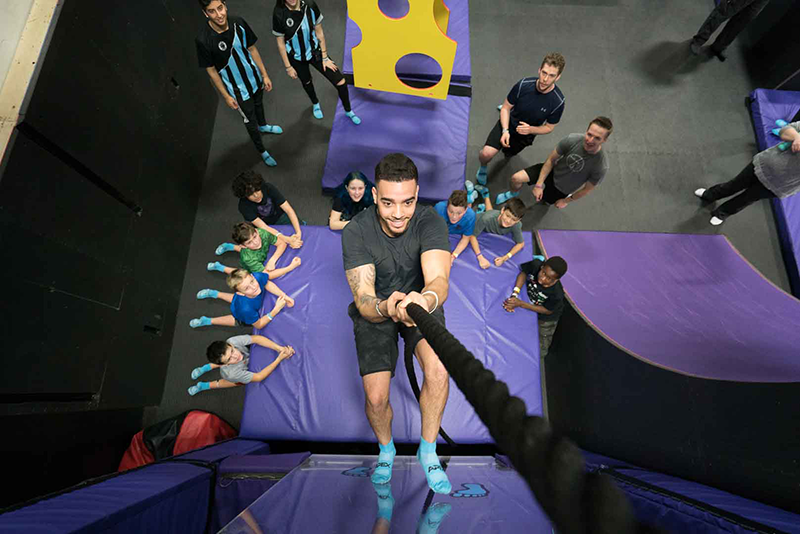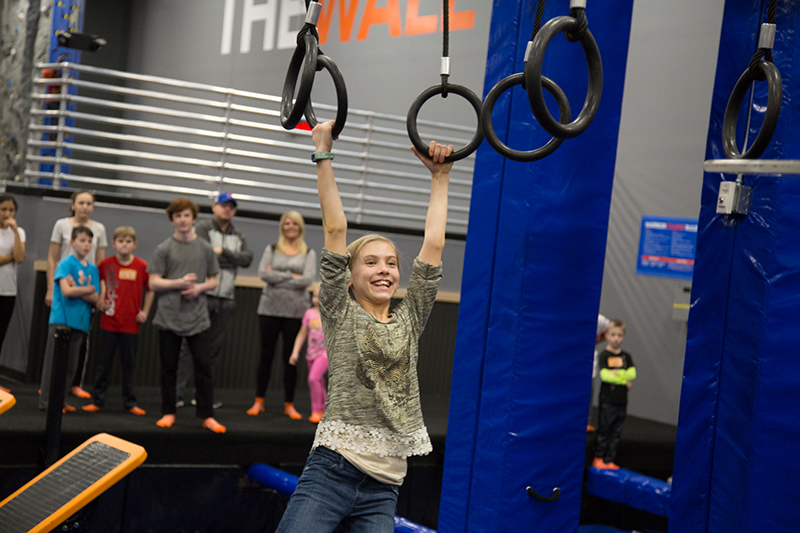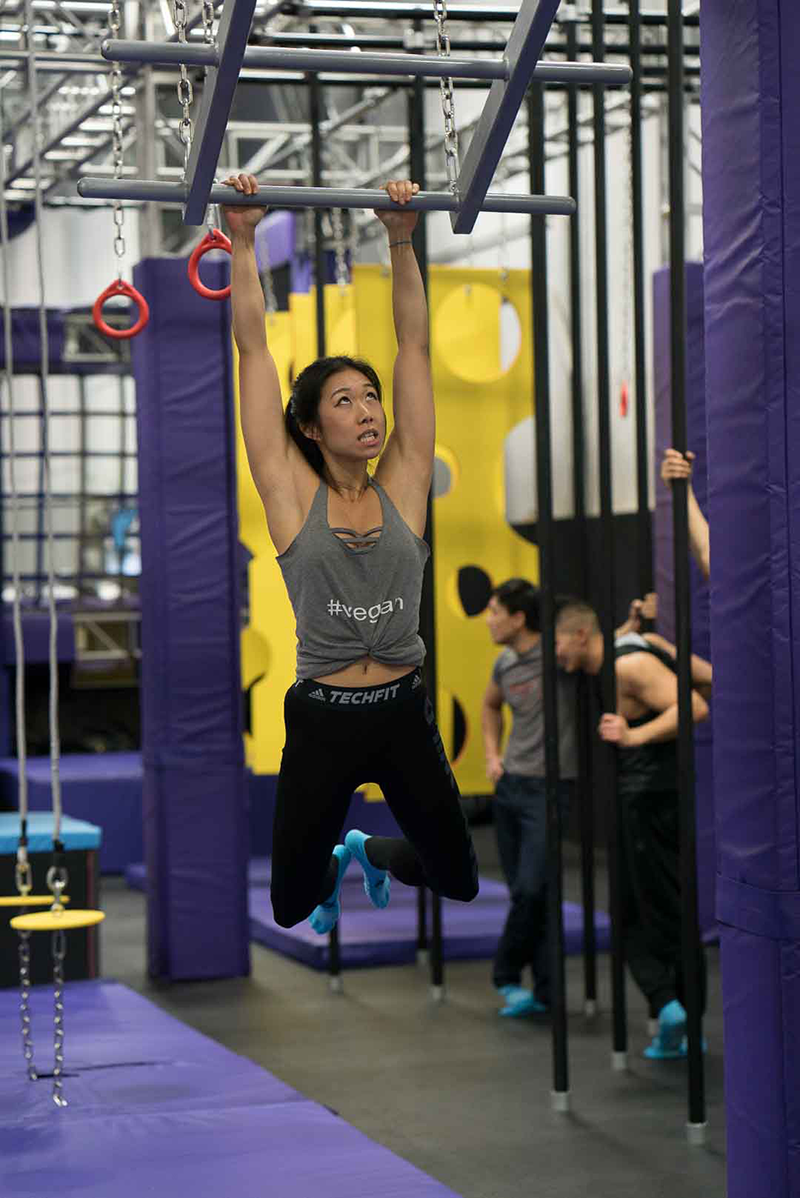Jumping on a Trend

A recent TV ratings poll revealed “American Ninja Warrior,” an extreme obstacle course competition show, triumphed over “Monday Night Football” and tied with the Gordon Ramsay-hosted “Hell’s Kitchen.” “American Ninja Warrior” has been a television staple for 12 years, and it may continue to possess lasting appeal.
Some family entertainment centers (FECs) and trampoline parks have installed scaled-down versions of the obstacle courses at their facilities after the TV show became so popular.
Sky Zone parks have more than 100 Warrior Courses among their more than 170 locations in the United States, United Kingdom, India, Mexico, and other countries. The first one was installed in 2015. Both Ohio locations of Play: Adventure Park also have ninja warrior courses; the first one was erected in 2017, and the second location opened to guests in 2020.

Many Different Obstacles
“American Ninja Warrior” viewers have become very familiar with the warped wall, cargo net, salmon ladder, spinning log, wingnuts, and other obstacles competitors attempt to conquer on the show.
“At Sky Zone, we have dozens of different obstacles built from high-grade, durable materials that can endure use by thousands of guests each year,” says Alex Benepe, vice president of innovation at parent company CircusTrix. “We focus on the simple obstacles yet try to ensure each Warrior Course has a range of difficulty so there’s at least one area of the course that guests of all ages can complete.”
Greg Carlin, CEO of both Play: Adventure Parks, agrees and says his attraction tries to provide a mix of obstacles that require balance, upper body strength, core, and lower body elements. He, too, has a range of guests, from young children to adults, with various skill levels, and Carlin tries to have challenges for all different abilities.
In Sevierville, Tennessee, at Sevier Air Trampoline & Ninja Warrior Park, Joe Reeping, general manager, notes his team wanted to create an FEC with more than just a standard trampoline park, so they added the ninja course.
“We have guests come just for the ninja warrior course,” Reeping says.
Popular or Outdated?
Like any trend, ninja courses have crested and waned, but whether their time has ended for the attractions industry remains to be seen.
“We have found that they’ve declined in popularity over time, just like any new attraction,” Benepe says. “However, we also discovered that when you refresh the courses with new obstacles, including some new inflatables produced by our partners at AirTrack, we see renewed guest interest in the attraction.”
When the warrior course is just one part of a park that also offers zip lines, climbing walls, ropes courses, and trampolines, it’s difficult to tell how popular the course is. At Play: Adventure, guests pay one admission fee and have access to all these attractions.
“Guests love to have the ability to go through the courses as part of their overall time,” Carlin says. “For other guests, the ninja courses seem to intimidate them, but we’ve found that staff interaction and support is what makes the difference in engaging guests.”
Visitors also want to be assured all areas they touch have been sanitized.

Cleaning Protocols
Since the start of the pandemic, cleaning landing areas and other touchpoints where warrior courses have been installed once a day is not nearly enough. Visitors are looking for FECs and trampoline parks to be spotless and sparkling.
Benepe says Sky Zone parks keep a regular, rigorous cleaning and inspection schedule for the foam pits, air bags, and other course padding.
“I was taught to clean up after myself at an early age, and that same practice is essential to us as a business,” Carlin says. “We invest a lot of money into the equipment, and we take care of it for our guests, as well as for the longevity of it.”
Sevier Air has developed a thorough cleaning regimen, employing a full-time cleaner during the park’s open hours and a professional company that details high-traffic areas. Carpets are cleaned weekly or biweekly depending on the season and amount of traffic.
“We pride ourselves on cleanliness and are often complimented by our guests about it,” Reeping says. “As for hand sanitizer, we encourage our guests to use ours after they leave one device and move on to another.”
Covering Liabilities
States like Tennessee have safety, liability, and waiver guidelines set for attractions to follow. The Amusement Device Unit of Tennessee requires operators to hire inspectors for annual inspections and to complete state forms and other documentation needed to keep guests safe.
Reeping’s team also shows a safety video before guests fill out their safety waiver and buy jump tickets.
Besides the video, the park has safety signage throughout, and staff safety monitors keep watch over guests.
“Warrior courses have a fairly low incident rate, and the incidents tend to be very minor,” Benepe explains. “Waivers differ by state, but as the first indoor trampoline park brand, we have fine-tuned our waiver over 17 years across our global network.”
Carlin suggests having good counsel and building a waiver specific to the operation and business.
Manufacturing Ninja Courses for Various Skill Levels
Luke Schueler, owner and co-founder of 15 locations of Flying Squirrel trampoline parks and owner and co-founder of manufacturer Shock Trampoline Park Systems, says while he doesn’t currently have Ninja Warrior courses in his Flying Squirrel locations, his manufacturing company builds these courses for others.
“We can customize every square inch of a facility with a course and still keep in mind safety and insurance standards,” Schueler says.
Shock’s courses are designed in three different skill levels: children, teens and adults, and professional athletes.
Creating a course that challenges the top two skill levels won’t allow children to use it, he says. The higher skill level courses require height restrictions and include difficult elements that increase the competitive edge.
“We make our ninja courses as safe as possible by adding foam blocks and airbags so guests don’t ever come into contact with a hard surface,” Schueler says.
- Heather Larson is a freelance writer in Tacoma, Washington, who frequently writes about small-business issues.
